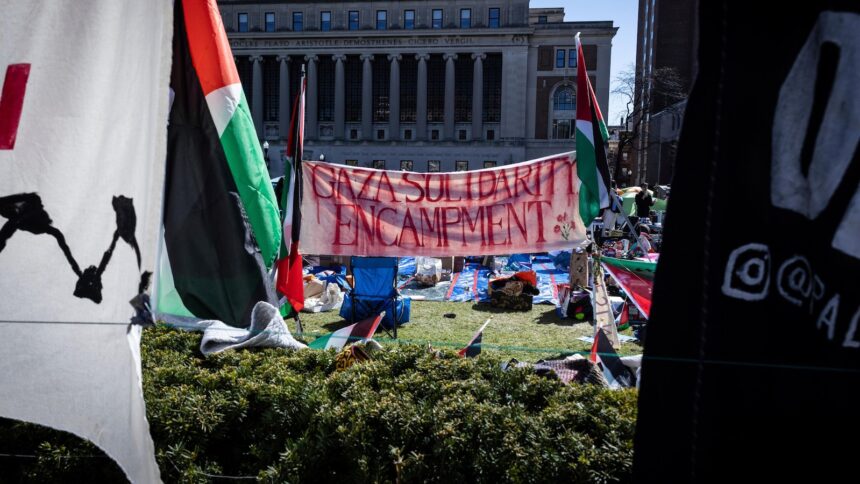Protests are roiling college campuses nationwide as administrators with graduation ceremonies next month face demands that schools cut financial ties to Israel against the backdrop of the Israel-Hamas war.
Many campuses were largely quiet by early afternoon Sunday but about 275 people were arrested on Saturday at campuses including Indiana University at Bloomington, Arizona State University and Washington University in St. Louis. Those have pushed the number of arrests nationwide to nearly 900 since New York police removed a pro-Palestinian protest encampment at Columbia University and arrested more than 100 demonstrators on April 18.
Since then, students have dug in at dozens of pro-Palestinian encampments around the country, prompting a range of responses from administrators — arrests and criminal charges, student suspensions or simply continued pleas to leave. The plight of students has become a central part of protests, with both the students and a growing number of faculty demanding amnesty. At issue is whether the suspensions and legal records will follow students through their adult lives.
Faculty members at universities in California, Georgia and Texas have initiated or passed largely symbolic votes of no confidence in their leadership.
White House national security spokesman John Kirby said President Joe Biden “knows that there are very strong feelings” but would leave managing the protests to local authorities.
“People should have the ability to air their views and to share their perspectives publicly but it has to be peaceful,” Kirby said on ABC’s ”This Week.”
In an interview that aired Sunday, Senate Republican Leader Mitch McConnell called it “a dangerous situation” and placed the responsibility with college administrators.
“There’s also antisemitism, which is completely unacceptable. I’ve been shocked to see that in this country,” he said on NBC’s “Meet the Press.”
Early protests at Columbia University in New York City sparked pro-Palestinian demonstrations across the country and students and administrators there have engaged in negotiations, the university said in a statement Saturday night.
Columbia has set a series of deadlines for protesters to leave encampment — which they have missed — but bringing back police “at this time” would be counterproductive, the school wrote in an email to students.
Washington University in St. Louis locked some campus buildings and arrested protesters Saturday.
The Riverfront Times, a St. Louis weekly newspaper, reported more than 80 people were arrested during the protest that began in public areas before moving to the campus in the afternoon. Megan Green, president of the St. Louis Board of Aldermen, said in a social media post that she was present and the protest remained calm “until the police came in like an ambush.”
The St. Louis Police Department said in a social media post that it assisted campus police, although city officers did not make any arrests.
The University of Southern California said on Saturday it had temporarily closed its University Park Campus to nonresidents and USC property was vandalized by members of a group “that has continued to illegally camp on our campus,” disrupt operations and harrassing people.
Students declined attempts by university President Carol Folt to meet, and the administration hopes for “a more reasonable response Sunday before we are forced to take further action,” said Joel Curran, senior vice president of communications.
USC drew criticism after refusing to allow the valedictorian, who has publicly supported the Palestinian cause, to make a commencement speech. Administrators then scrapped the keynote speech by filmmaker Jon M. Chu. The school on Thursday announced the cancellation of its main graduation event, a day after more than 90 protesters were arrested by police in riot gear.
In Boston, police in riot gear cleared an encampment on the campus of Northeastern University on Saturday.
Massachusetts State Police said about 102 protesters were arrested and will be charged with trespassing and disorderly conduct.
Northeastern said in a statement that the demonstration, which began two days ago, had become “infiltrated by professional organizers” with no affiliation to the university and antisemitic slurs, including “kill the Jews,” had been used.
The Huskies for a Free Palestine student group disputed the university’s account, saying in a statement that counterprotesters were to blame for the slurs and no student protesters “repeated the disgusting hate speech.”
Students at the Boston protest said a counterprotester attempted to instigate hate speech but insisted their event was peaceful.
Indiana University campus officers and state police arrested 23 people Saturday at an encampment on the school’s Bloomington campus. Tents and canopies were erected Friday in violation of school policy and group members were detained after refusing to remove the structures with charges ranging from criminal trespass to resisting law enforcement, police said.
Arizona State University said 69 people were arrested early Saturday on suspicion of criminal trespassing for setting up an unauthorized encampment on a lawn on its Tempe campus. The protesters were given chances to leave and those who refused were arrested.
The nationwide campus protests began in response to Israel’s offensive in Gaza. Hamas launched a deadly attack on southern Israel on Oct. 7, when militants killed about 1,200 people, most of them civilians, and took roughly 250 hostages. Vowing to stamp out Hamas, Israel launched an offensive in Gaza. In the ensuing war, Israel has killed more than 34,000 Palestinians in the Gaza Strip, according to the local health ministry.
Israel and its supporters have branded the university protests as antisemitic, while critics of Israel say it uses such allegations to silence opponents. Although some protesters have been caught on camera making antisemitic remarks or violent threats, organizers of the protests, some of whom are Jewish, say it is a peaceful movement aimed at defending Palestinian rights and protesting the war.
___
Beck reported from Omaha, Neb. and Thompson from Buffalo, N.Y. Associated Press journalists in various locations contributed, including Jacques Billeaud, Aaron Morrison, Stefanie Dazio, Kathy McCormack, Jim Vertuno, Acacia Coronado, Sudhin Thanawala, Jeff Amy, Jeff Martin, Mike Stewart, Collin Binkley, Carolyn Thompson, Jake Offenhartz, Jesse Bedayn and Sophia Tareen.

